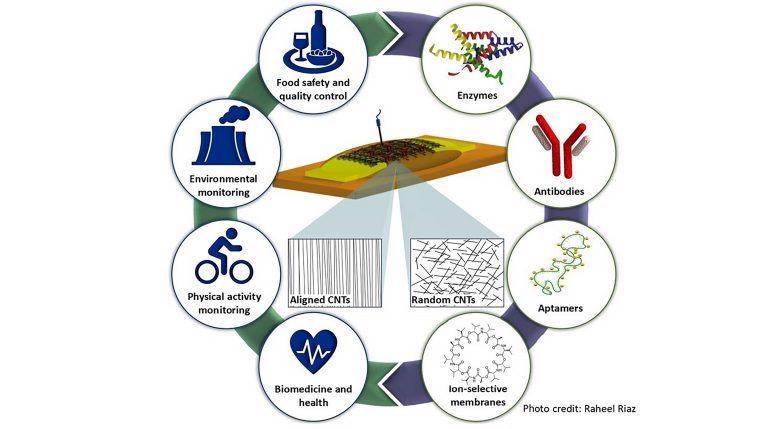There has been an ever-increasing need for sensitive and selective electronic biosensors for various applications. Biosensors are analytical devices that monitor a target of interest in real-time and are best suited for clinical health care, environmental sensing, drug development, as well as food safety and quality control.
 Electrolyte-gated carbon nanotube field-effect transistor-based biosensors show promise for many applications. Image Credit: Raheel Riaz.
Electrolyte-gated carbon nanotube field-effect transistor-based biosensors show promise for many applications. Image Credit: Raheel Riaz.
Electronic biosensors have gained considerable attention, thanks to their lower manufacturing cost, simple design, minimal sample preparation, short analysis time and potential for use by unskilled personnel in the field.
A team of researchers from the Free University of Bozen-Bolzano and ETH Zurich have analyzed scientific developments in electrolyte-gated carbon nanotube field-effect transistor (EG-CNTFET) biosensors. Their findings have been reported in AIP Publishing’s Applied Physics Reviews. Biosensors exhibit excellent electronic properties and inherent signal amplification, which allow them to detect a broad range of biomolecules with great sensitivity.
A biosensor’s biorecognition element — like antibodies, enzymes, ion-selective membranes or aptamers — is one of its core aspects that helps in the selective recognition of the analyte (a substance whose chemicals are identified and quantified) of interest. The interaction between the biorecognition element and the analyte is converted into a measurable signal, for example, an electrical signal, by biotransduction devices.
Biosensors using (field-effect transistors) as biotransduction elements are one of the most promising devices for biosensing applications, because they have already demonstrated high sensitivities toward several analytes down to picomolar concentration. Among all the possible materials that can be used for FET-based biosensors, semiconducting carbon nanotubes are interesting, because they have favorable electrical and chemical properties.
Mattia Petrelli, Free University of Bozen-Bolzano
By arranging these biosensors with various biorecognition elements, Petrelli added, “it is possible to achieve selective detection of different analytes, such as biomolecules, cancer biomarkers, bacteria, and ions to name only a few. Despite reports that demonstrate the potential translation of these biosensors to real-world applications, challenges must be overcome before they are commercially available.”
Furthermore, EG-CNTFET-based biosensors can identify only one analyte at a time. Various interfaces contained in complex media like sweat, blood or saliva also render the detection of particular signals difficult.
This limits the applicability of these biosensors for real-life applications. The selectivity of the device should be carefully evaluated against all possible interfering agents, especially within complex detection environments. Once these challenges are tackled, we can envision these biosensors being implemented for diverse applications within the near future.
Mattia Petrelli, Free University of Bozen-Bolzano
Journal Reference:
Shkodra, B., et al. (2021) Electrolyte-gated carbon nanotube field-effect transistor-based biosensors: Principles and applications. Applied Physics Reviews. doi.org/10.1063/5.0058591.
Source: https://publishing.aip.org/